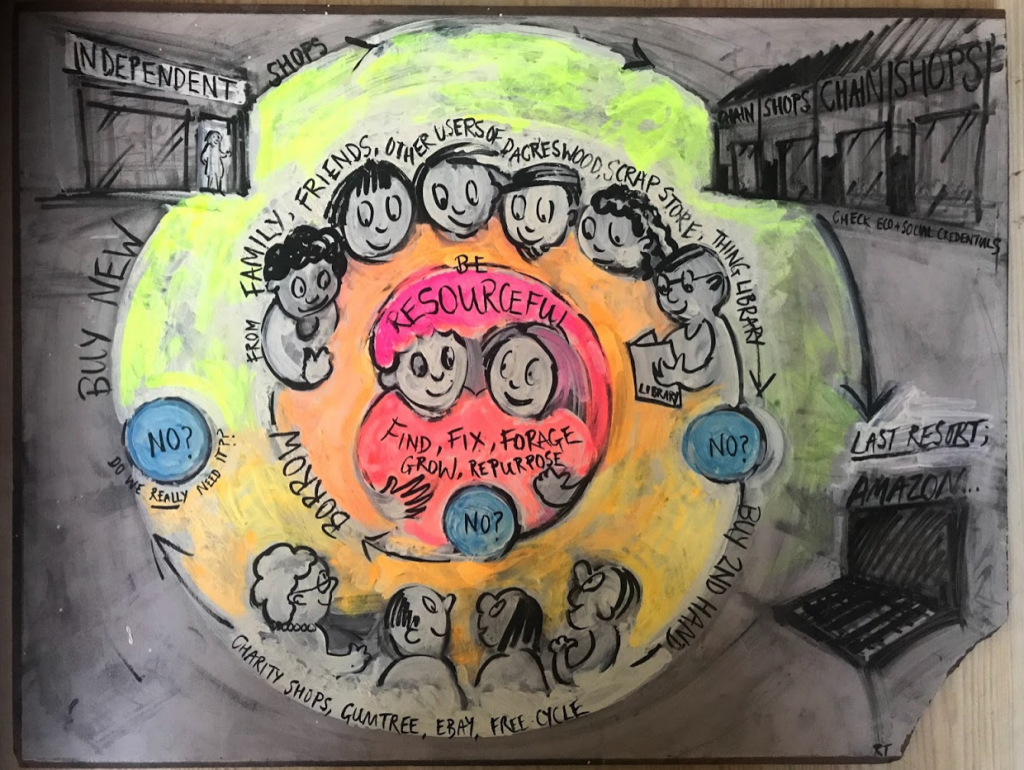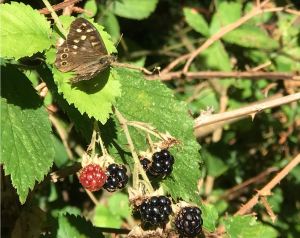By Rowan Salim
 On a tidy up time forest check walk with one of the children, we hear a sharp rasping sound. We both stop as we spot a squirrel running up a tree. We hold still. We often see squirrels at Dacres Wood, but this squirrel is up to something. It stops, freezes. It starts to bob its head. Its tale shivers. It suddenly calls out abruptly like 5 taps on a snare drum. We also freeze and observe it for about a minute until it scurries up the tree and disappears into the canopy. What was it doing?
On a tidy up time forest check walk with one of the children, we hear a sharp rasping sound. We both stop as we spot a squirrel running up a tree. We hold still. We often see squirrels at Dacres Wood, but this squirrel is up to something. It stops, freezes. It starts to bob its head. Its tale shivers. It suddenly calls out abruptly like 5 taps on a snare drum. We also freeze and observe it for about a minute until it scurries up the tree and disappears into the canopy. What was it doing?
During a morning meeting in the quiet room, I spot 4 magpies on the driveway engaged in what seemed like a heated conversation. They face each other in pairs as if having their own meeting. Our meeting stops as 8 heads peer out the window trying to work out what is happening. Theories start to be exchanged. ‘It’s just nature’, one of the children says in an explanatory tone, sitting back down.
A wasp is fighting for its life in a flimsy spider’s web by the entrance gate.  Another has just about given up in a complex web in the ivy behind the garage. In the midst of tidy up time, someone finds a drowsy wasp on one of the pillows. I pick up the pillow and walk to the door, flicking the wasp outdoors, eager to get back to my tidying tasks. I watch as one of the children observes it for a moment as it struggles for its life on the concrete and gets a piece of paper to transport it out into the reserve where it might have a better chance. We learn from each other.
Another has just about given up in a complex web in the ivy behind the garage. In the midst of tidy up time, someone finds a drowsy wasp on one of the pillows. I pick up the pillow and walk to the door, flicking the wasp outdoors, eager to get back to my tidying tasks. I watch as one of the children observes it for a moment as it struggles for its life on the concrete and gets a piece of paper to transport it out into the reserve where it might have a better chance. We learn from each other.
Living in a forest, nature observation is inevitably part of life. The children have consistently been sharing and learning from their observations. This year we have started a nature observation log book which everyone is invited to record their observations in. We have also started a weekly bushcraft and ecology course. This is an intentional, Buzz space, where we get together every Thursday and explore our relationship with nature, our skills and understanding. As Free We Grow, we are also in touch with the ecology officers at Lewisham Council to understand how we can enhance our role as custodians and caretakers of the woods and are planning some co-working days with volunteers in the spring to enhance the habitats in the reserve.
These conversations are happening on many levels, primarily through the children’s own enquiries and curiosities. It is felt in the love and care for animals expressed by two of our children when sharing their vegan identity, or the pride with which another speaks about being vegetarian. I overhear a lunchtime conversation about the amount of plastic used in seaweed packaging, and whether it’s ok to bring a packet of crisps in for snack every day. And of course the plans to build a solar powered helicopter boat.
The adults at Free We Grow are also working out what it means to be good custodians of the planet and how to live in integrity with our values and model them. One example of this is in working out a procurement policy for our space. Resistance to overt consumerism is one way of slowing down the ecological crisis and we have tried to embrace a new way of being with material goods in our approach to procurement. Visualising this in a format which is shareable and invites discourse is one way of bringing some of the more administrative elements of running Free We Grow into a forum which is shared by all users. One of our parents, Rosie Thwaites, who is an illustrator by training, worked this summer to bring our policy to life in this illustration.
The vision of Free We Grow is to have “A democratic environment embedded in and connected to the world around us where children can grow socially competent and ecologically mindful and where their innate curiosity and instinct to play and learn is trusted and nurtured”.
To a community which is used to all sitting together and making decisions in a circle, it must feel strange to live in a democracy where people are resorting to blocking the streets and being arrested in order to be heard by those in power (see part one of this blog post). To children who may be used to associating the police with brutality on screens, it might feel strange to see police officers diligently cutting free protesters in order to arrest them without causing injury.

Where children watch documentaries about the Arctic Circle and ocean plastic, maybe it feels strange to unpack 100 calories at snack time from two layers of plastic. The world we live in is complex and replete with inconsistencies. Children are our most honest observers and as they negotiate the spaces in between our world’s inconsistencies, we can make room for questions, for dialogue, for play and experimentation, in a safe, honest, and reassuring way.
Rowan
